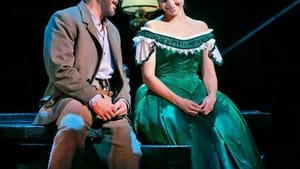Stay in the Loop
BSR publishes on a weekly schedule, with an email newsletter every Wednesday and Thursday morning. There’s no paywall, and subscribing is always free.
A chilly mountain
Jennifer Higdon’s 'Cold Mountain'

Jennifer Higdon’s first opera is based on Charles Frazier’s award-winning 1997 novel of the same name. It tells the story of Civil War soldier W.P. Inman, who deserts from the Confederate Army to travel to his North Carolina mountain home. Inman’s 300-mile journey and his trials along the way are reminiscent of Homer’s Odyssey, but don’t expect the equal of Odysseus’s adventures: It’s best if you attend Cold Mountain with modest expectations.
Both the book and its 2003 film adaptation were hailed for the depiction of the horror of war, but that’s hardly a unique topic, even in opera; see, for instance, the recent work about a Vietnam vet, Glory Denied. Thus this narrative has less emotional impact than it did in 1997 and 2003.
A too-cautious approach
Higdon has the background, both personal and musical to depict that milieu; she grew up in the Blue Ridge Mountains of Tennessee, and her orchestral compositions display colorful sonorities. But this score is too cautious in letting those elements unfurl. Higdon does not expand on the rich music vocabulary she used in her Soliloquy, All Things Majestic, and Concerto for Orchestra. With her traditionally tonal, rather than discordantly modern, style, one might expect music along the lines of Samuel Barber’s Knoxville Summer of 1915 or Aaron Copland’s Appalachian Spring. If only it were so — or if only it had the color of Higdon’s blue cathedral, in which she used tiny tinkling chimes to evoke heaven.
There are many moments in Cold Mountain in which the orchestra merely comments on what a character just said: A reference to rain is followed by tinkling sounds; to bird, with flutes; to snow, with appropriately soft, feathery music. Contrast that with the start of Act III in Puccini’s La Bohème, in which the orchestra creates a chill that makes the audience shiver before any singer utters a word, or the opening of Verdi’s Otello, in which the orchestra portrays a storm before anyone opens his or her mouth.
In comparison, Cold Mountain is an expertly crafted dramatization of an Odyssey tale, with music that is enjoyable without being memorable.
No aria for the hero
Nathan Gunn is a poignant Inman, sympathetic in acting and singing. It’s frustrating that the score doesn’t give him a stirring aria that might stand alone in a concert or on a recording. He is not so much a protagonist as a man to whom things happen, and he could use a signature piece.
Just before the war Inman met a preacher’s daughter, Ada Monroe (the lovely mezzo Isabel Leonard). She is an interesting person, a literate country gal who loves to use similes, and she is given an aria of her own. Inman realizes she is the love of his life and wants to return and marry her.
Back in North Carolina, Ada’s father has died, and she is befriended by a mysterious mountain girl, Ruby (the strong Emily Fons), who becomes her partner in running a farm. The women’s bond is touching. Inman returns after a four-year absence, and he and Ada sing a love duet that is sweet but doesn’t reach the soaring heights you’d expect after such a long separation.
Instead, the musical climax is the overlapping reappearance of characters from past scenes, including an escaped slave named Lucinda (the wonderful Deborah Nansteel) who hates all white men and had pulled a gun intending to kill Inman. Here and throughout the opera, the best moments are of multiple-voice ensembles — hymnlike choruses in which mixed voices sing of leaving home and family in Act I, and of soldiers who are buried and forgotten in Act II.
First staging
This Santa Fe premiere features a large cast (which also will appear in Philadelphia), including Kevin Burdette as Ruby’s dissolute father, Stobrod; Anthony Michaels-Moore as both Ada’s father, Monroe, and Pangle, the simple-minded companion of Stobrod. The dramatic tenor Jay Hunter Morris was a vivid Teague, a villainous leader of a Confederate military unit searching for deserters or people hiding them.
Director Leonard Foglia placed the action of Act I across a wide abstract set by Robert Brill with massive planks crisscrossing one another, suggesting the intersecting pieces of the sprawling story. It looks cluttered, and I was glad to see that Act II was played on more comfortable ground.
Projections by Elaine McCarthy gave us illuminating stars in the sky and a blizzard of snow. The carefully timed lighting by Brian Nason enabled effective crosscutting between episodes.
What, When, Where
Cold Mountain. Opera by Jennifer Higdon. Libretto by Gene Scheer. Leonard Foglia directed; Miguel Harth-Bedoya conducted. Coproduction of Santa Fe Opera and Opera Philadelphia. Santa Fe, New Mexico, August 2015. Scheduled for the Academy of Music in Philadelphia, February 5-14, 2016. 215-732-8400 or operaphila.org.
Sign up for our newsletter
All of the week's new articles, all in one place. Sign up for the free weekly BSR newsletters, and don't miss a conversation.

 Steve Cohen
Steve Cohen